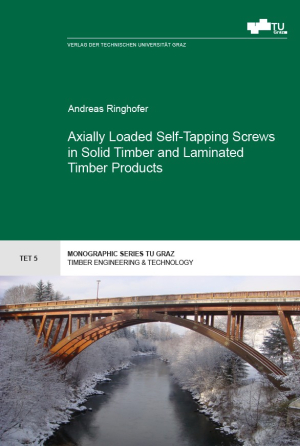Within the last 25 years, self-tapping screws have become the most
relevant fasteners in contemporary timber engineering. Restricting the
scope to their axial loading, the present thesis aims on gaining a
fundamental knowledge concerning the specifics of this kind of
dowel-type fastener. The related considerations are divided into the two
main topics, namely the (steel) product “self-tapping screw” itself and
the withdrawal behaviour, defined as the axial composite interaction
with the timber material where it is inserted into.
With regard to
the product performance, the main outcomes are the derivation and
verification of a mechanical approach, describing the relationships of
its relevant design properties in dependence of a geometrically varying
thread profile, as well as some fundamental findings in terms of
fatigue-relevant loading and hydrogen-induced stress corrosion cracking
(HISCC).
In case of the withdrawal behaviour, based on about 14,000
experimental results, the impact of several influencing parameters is
determined, discussed and described by means of empirical, stochastic
and mechanical modelling. Parameters, where a significant influence was
found, are finally included in the determination of a universal approach
for the prediction of the screw’s mean and characteristic withdrawal
strength, irrespective the timber product used and the position the
screw is inserted into.
Issue: Open Access E-Book
ISBN: 978-3-85125-556-0
Language: Englisch
Release date: November 2017
Series: Monographic Series TU Graz / Timber Engineering & Technology, Issue 5
Within the last 25 years, self-tapping screws have become the most
relevant fasteners in contemporary timber engineering. Restricting the
scope to their axial loading, the present thesis aims on gaining a
fundamental knowledge concerning the specifics of this kind of
dowel-type fastener. The related considerations are divided into the two
main topics, namely the (steel) product “self-tapping screw” itself and
the withdrawal behaviour, defined as the axial composite interaction
with the timber material where it is inserted into.
With regard to
the product performance, the main outcomes are the derivation and
verification of a mechanical approach, describing the relationships of
its relevant design properties in dependence of a geometrically varying
thread profile, as well as some fundamental findings in terms of
fatigue-relevant loading and hydrogen-induced stress corrosion cracking
(HISCC).
In case of the withdrawal behaviour, based on about 14,000
experimental results, the impact of several influencing parameters is
determined, discussed and described by means of empirical, stochastic
and mechanical modelling. Parameters, where a significant influence was
found, are finally included in the determination of a universal approach
for the prediction of the screw’s mean and characteristic withdrawal
strength, irrespective the timber product used and the position the
screw is inserted into.
These could also be of interest to you
- Catalog
- New releases
-
Open Access publications

- Enhanced e-books
-
Series
- Akademische Reden an der Technischen Universität Graz
- Arbeitshilfen für die Praxis
- Archiv und Bibliothek
- Betonkolloquium
- Buddhist Architecture in the Western Himalayas
- BWL Schriftenreihe
- Electrical Power Systems
- Fachbücher Planung und Bau
- Facts & Figures
- Festschriften TU Graz
- Forschungsreihe IBBW
- Forum Technik und Gesellschaft
- Geodesy
- Immersive Learning Research Network Conference; Workshop, short papers, poster
- Institut für Gebäudelehre Jahrbuch
- International Brain-Computer Interface (BCI) Meeting
- LM.VM.2014
- Logistik Werkstatt Graz
- Materialien zu Schwerpunkten am Institut für Gebäudelehre
- Mathematical Modelling of Weld Phenomena
- Monographic Series TU Graz
- Monographic Series TU Graz|Advanced Materials Science
- Monographic Series TU Graz|Computation in Engineering and Science
- Monographic Series TU Graz|Production Science and Management
- Monographic Series TU Graz|Railway Research
- Monographic Series TU Graz|Reihe Fahrzeugtechnik
- Monographic Series TU Graz|Schriftenreihe des Instituts Betonbau
- Monographic Series TU Graz|Structural Analysis
- Monographic Series TU Graz|Techno- und sozioökonomisch orientierte Betriebswirtschaft
- Monographic Series TU Graz|Technoökonomie und industrielles Management
- Monographic Series TU Graz|Timber Engineering & Technology
- November Talks
- Proceedings of the International Brain-Computer Interface
- Schriftenreihe des Instituts für Baubetrieb und Bauwirtschaft
- Schriftenreihe des Instituts für Straßen- und Verkehrswesen
- Schriftenreihe des Instituts für Wohnbau der TU Graz
- Schriftenreihe zur Wasserwirtschaft
- Science, Technology and Society online
- Seminarreihe Bauunternehmensführung
- Studien zur Architektur | TU Graz
- Textbook Series
- Transform Industry: Guiding the transformation of SMEs
- TU Graz Jahresbericht | Annual report
- TU Graz people
- TU Graz Research
- VKM-THD Mitteilungen; IVT-Mitteilungen ab Bd. 100
- Authors
- Sale
Contact
Verlag der
Technischen Universität Graz
Technikerstraße 4
8010 Graz, Österreich
UID(VAT) ATU 57477929
contact person
Gabriele Groß
Tel.: +43(0)316 873 6157
E-Mail: verlag [ at ] tugraz.at
Privacy Overview
Necessary cookies are absolutely essential for the website to function properly. These cookies ensure basic functionalities and security features of the website, anonymously.
| Cookie | Dauer | Beschreibung |
|---|---|---|
| cookielawinfo-checkbox-analytics | 11 months | This cookie is set by GDPR Cookie Consent plugin. The cookie is used to store the user consent for the cookies in the category "Analytics". |
| cookielawinfo-checkbox-functional | 11 months | The cookie is set by GDPR cookie consent to record the user consent for the cookies in the category "Functional". |
| cookielawinfo-checkbox-necessary | 11 months | This cookie is set by GDPR Cookie Consent plugin. The cookies is used to store the user consent for the cookies in the category "Necessary". |
| qtrans_front_language | 1 year | This cookie is set by qTranslate WordPress plugin. The cookie is used to manage the preferred language of the visitor. |
| viewed_cookie_policy | 11 months | The cookie is set by the GDPR Cookie Consent plugin and is used to store whether or not user has consented to the use of cookies. It does not store any personal data. |
| woocommerce_cart_hash | session | This cookie is set by WooCommerce. The cookie helps WooCommerce determine when cart contents/data changes. |
Analytical cookies are used to understand how visitors interact with the website. These cookies help provide information on metrics the number of visitors, bounce rate, traffic source, etc.
| Cookie | Dauer | Beschreibung |
|---|---|---|
| _pk_id | 1 year 27 days | Required for the operation of Matomo, an analysis tool that tracks and analyzes user behavior. |
| _pk_ref | 13 months | Required for the operation of Matomo, an analysis tool that tracks and analyzes user behavior. |
| _pk_ses | 30 minutes | Required for the operation of Matomo, an analysis tool that tracks and analyzes user behavior. |
Other uncategorized cookies are those that are being analyzed and have not been classified into a category as yet.
| Cookie | Dauer | Beschreibung |
|---|---|---|
| yt-remote-connected-devices | never | No description available. |
| yt-remote-device-id | never | No description available. |







